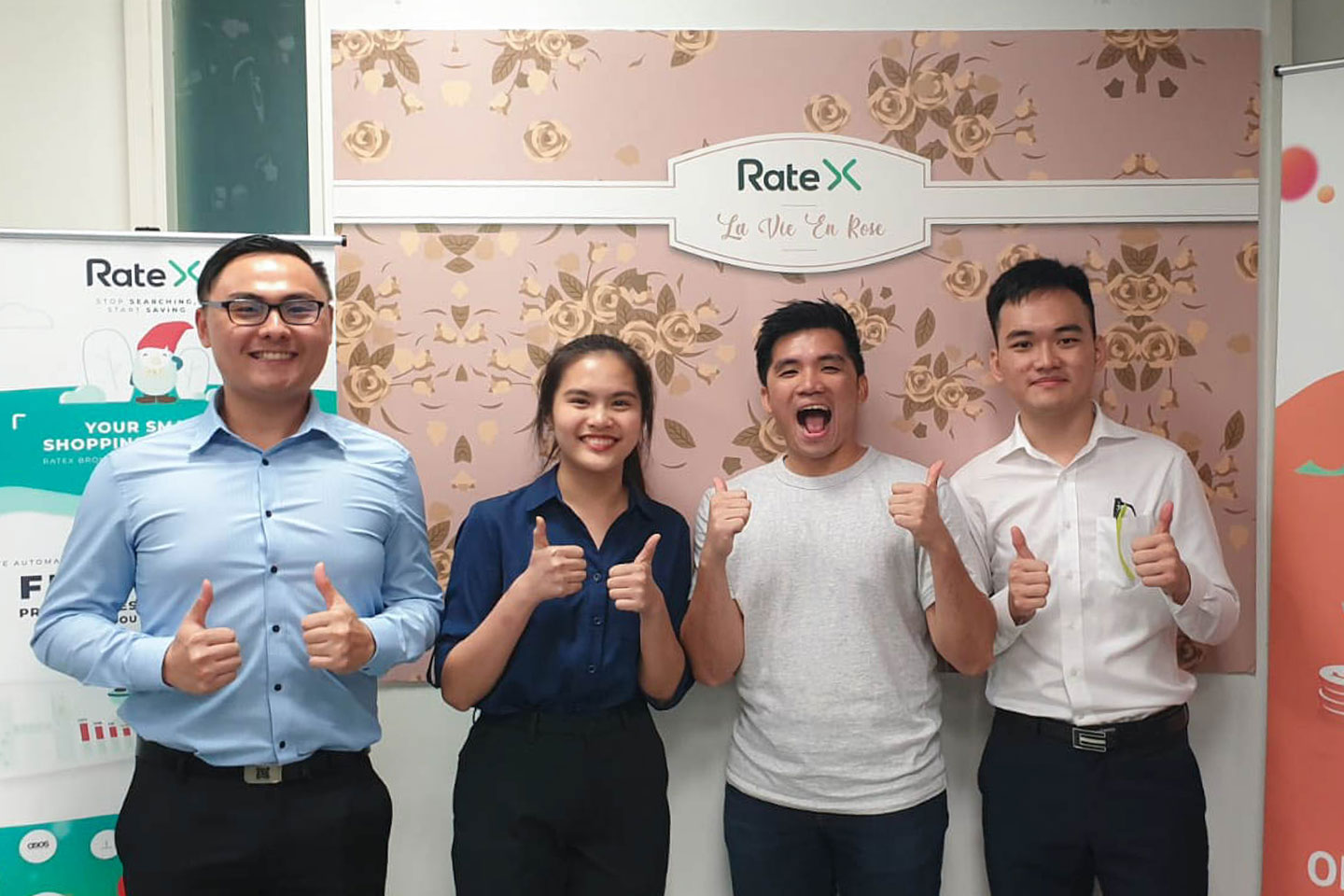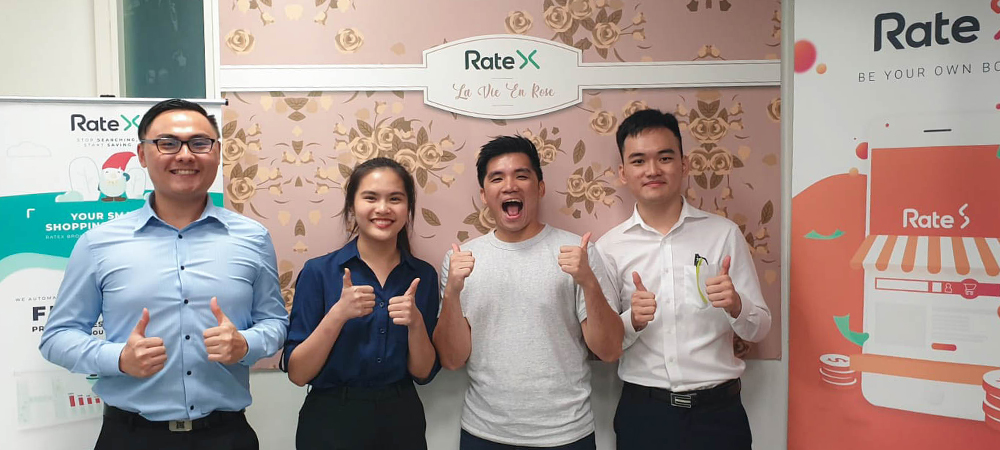Albert was an active student in the NUS Business School. He was involved in programmes such as the University Scholars Programme (USP) and the NUS Overseas College (NOC) Programme, which he completed at New York University. Furthermore, he excelled in both academics and co-curricular activities, winning numerous awards in renowned international case competitions and consistently securing scholarships year after year.

Alumni Spotlight Stories: Albert Ho, Rate

Outside of school, he interned in various companies such as Dymon Asia Capital as a part of their venture capital team before moving onto his final internship in a large-scale consulting firm, A.T. Kearney. After graduation, he joined his friends at Rate, a Singapore-based tech startup founded in 2016.
Q: Having been in the working world for the past few years, what do you wish you had done differently when you were still studying?
Firstly, I wish I had taken more computer science modules even though they may be time-consuming. While the Business School offers its own coding modules and they are undeniably beneficial, I personally feel that they are not as in-depth as those conducted by the School of Computing, which give you a more complete understanding of coding. I emphasise on the importance of having coding knowledge as I feel that my current knowledge of coding has helped me to empathise with my employees and the constraints they face when they are programming, which makes managing them easier.
Secondly, it would have been vastly beneficial if I had taken more language modules when I was an undergraduate student in the Business School. I took the level 1000 module for Bahasa Indonesia in NUS and it was extremely useful when Rate was expanding into Indonesia. Having a good grasp of the native language will always be an excellent tool for an individual or business that seeks to enter a country.
Thirdly, although I loved my NOC experience in the New York University, I wish l had taken the extra effort to step out of my comfort zone. Instead of spending most of my time with other NUS students that were in the same exchange programme, I should have stayed at a different place or worked with locals to enhance my experience in New York.
Q: What are some insights you would like to share with students regarding school?
The most important thing for students is to make lasting connections. During my time in the Business School, I was pretty adventurous and took up various commitments (the Bizad Club, Case Consulting Group, etc.) and they helped me make a lot of friends. I want to emphasise that having a good reputation, for instance by being responsible in group projects, is vital and you should build good relationships with your course mates. When you go out into the working world, it would be easy for you to reach out to your coursemates when the need arises.
It is also important that you try to meet students from other faculties. If you only have friends from the Business School, it would be challenging for you to think about issues from multiple perspectives – everyone in your group will reinforce one another’s thoughts and ideas. Interacting with students who have been trained differently in other faculties helps you gain new viewpoints and be creative.
Moreover, undergraduate students should keep an open mind and try out as many things as possible. Some of us may feel that we have a clear idea of the type of career or future we want. But as time passes, we sometimes realise that things are not what we thought they were. Nonetheless, if you have explored enough and are absolutely sure of what you want to do, you should start to chase your aspirations early especially if your dream job is very popular and competitive.
Q: With your diverse work experiences in both overseas (USA) and local companies, what are your thoughts about the differences between the two?
I would say the biggest difference is our cultures. To the Americans, we speak too quickly for them to understand. They are also very sociable as compared to Singaporeans – they enjoy and excel at having small talks while we usually have to force ourselves to be engaged in small talks. Socialising well is a very important skill for us to work on, because your supervisor must trust that you can talk and pitch to the clients well. Another thing is that Singaporeans are generally more analytical, so we are better at quantitative tasks.
As for the startup scene, USA has a very large, homogenous market. If you can do well there, you should be doing fine. On the other hand, Singapore has a very small market. It is not good enough to just excel here. You should aim to work in other countries, if possible. That being said, keep in mind that the biggest problems with working abroad are the cultural and systemic differences between Singapore and other countries.
The most important thing for students is to make lasting connections
Q: How do you convince people to join Rate, a small startup?
The biggest challenge for us is hiring good programmers. There is a lack of talent in this aspect and many other companies offer better salaries than us to their employees.
Since Rate is a NOC company, we often appeal to students from NOC. Students from NOC tend to have similar mindsets and prefer the startup culture. We emphasise that each individual at Rate plays a crucial role to the company, which is an appeal to students. If students take up roles in larger companies like Facebook or Google, it is more likely that they will start off their careers assuming less prominent roles, or being limited to work on a project within the company.
Q: Do you think it is a challenge to manage people with more experience in the field than you at Rate?
Not really. In Rate, if your ideas are logical and factual, regardless of who you are or what position you hold, you will win the argument. We do not believe in a hierarchical system because we do not have enough time to follow a chain of command or a step-by-step process. In our company, everyone shows respect for everybody else because each of us is specialised in different areas. My time in Rate has also helped me to realise that it is good for me to understand and empathise with everybody’s job scope and the constraints that they face.
Q: What are some of the key traits/portfolio/experience you look out for when you are hiring someone for Rate?
The first thing we look out for is specialised skills. For example, in terms of marketing, we are looking for people who have actually worked on their own projects because the projects highlight the passions of individuals. We are not looking for a perfect resume and we do not solely select based on whether you have internship experience in big firms like Unilever. Ultimately, you must have some specialised skills to stand out.
If you don’t have the specialised skills that we are looking for, we would then see if you have any industry experience. Having a good internship or job position will help you gain industry experience that is valuable and attractive to firms in the future.
Last but not least, trusted referrals are helpful in our hiring decision.
Q: Do you have any advice for NUS Business school students who are looking to start their own businesses?
First, you must have good co-founders. My company’s co-founders met when we were all serving National Service.
Next, as I mentioned earlier, you should try to establish connections with as many people as possible. There is a real-life example I would like to share regarding connections. Currently, I am trying to solve some warehouse issues in Indonesia and I am always communicating with my friends and acquaintances to get their advice. You should also aim to make friends with people with good technical skills because it is very difficult to find such talented tech-savvy individuals for your startup.
Remember to apply the skills you have attained from your previous internships and jobs. If you do not have much experience, it will be better for you to work for a large firm to learn some valuable skills before you venture out on your own.
Most importantly, be confident!
The Alumni Spotlight Stories is a weekly series that explores a Bizad alumni’s journey from school to the working world. The story was first published in “Alumni Spotlight Stories: From Student Life to the Peak of your Career” compiled by the NUS Business School Alumni (NUSBSA).


